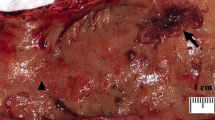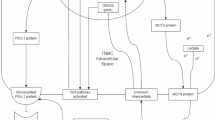Abstract
Background
Abnormal glycosylation patterns have been recognized as a feature of carcinoma-associated mucins. The expression of the Tn antigen in breast cancer tissue was investigated to assess its prognostic relevance.
Methods
Formalin-fixed, paraffin-embedded materials from 219 patients with breast cancer were used. Immunohistochemical staining of the Tn antigen was retrospectively investigated and a lesion staining 10% or more was considered positive.
Results
Tn antigen expression was present in 99 (45%) of 219 lesions. There were no correlations between Tn antigen expression and mean patient age, nodal status, estrogen receptor status, or menopausal status, but there was a slightly significant association between Tn and tumor size. Patients negative for the Tn antigen had a significantly better survival rate than those who were positive. Multivariate analysis also indicated that Tn expression correlated significantly with overall survival in addition to nodal status and tumor size.
Conclusions
Tn expression was a significant prognostic factor in breast cancer, but the significance was lost on multivariate analysis. The biological implication of Tn expression in breast cancer needs further investigation.
Similar content being viewed by others
Abbreviations
- CI:
-
Confidence interval
- ER:
-
Estrogen receptor
References
Hakomori S: Aberrant glycosylation in cancer and membranes as focused on glycolipids; Overview and perspectives.Cancer Res 45:2405–2414, 1985.
Burchell J, Gender S, Tayler-Papadimitriou J,et al: Development and characterization of breast cancer reactive monoclonal antibodies directed to the core protein of the human milk mucin.Cancer Res 47:5476–5482, 1987.
Singhal A, Hakomori S: Molecular changes in carbohydrate antigens associated with cancer.Bioassays 12:223–230, 1990.
Parry G, Beck JC, Moss L,et al: Determination of apical membrane polarity in mammary epithelial cell cultures: the role of cell-cell substratum and membrane-cytoskeleton interactions.Exp Cell Res 188:302–311, 1990.
Springer GF: Immunoreactive T and Tn epitopes in cancer diagnosis, prognosis, and immunotherapy.J Mol Med 75:594–602, 1997.
Inoue M, Ogawa H, Nakanishi H,et al: Clinical value of serum sialosyl-Tn antigens in patients with gynecologic tumors.Obstet Gynecol 75:1032–1036, 1990.
Itzkowitz SH, Bloom EJ, Kokal WA,et al: Sialosyl-Tn; A novel mucin antigen associated with prognosis in colorectal cancer patients.Cancer 66:1960–1966, 1990.
Japanese Breast Cancer Society: The general rules for clinical and pathological recording of breast cancer.Jpn J Surg 19:612–632, 1989.
Hirohashi S, Clausen H, Tamada T,et al: Blood group A cross-reacting epitope defined by monoclonal antibodies NCC-Lu-35 and -81 expressed in cancer of blood group O or B individuals; Its identification as Tn antigen.Proc Natl Acad Sci USA 82:7039–7043, 1985.
Springer GF, Desai PR, Bantwala I: Blood group MN precursors in normal and malignant human breast glandular tissue.J Natl Cancer Inst 54:335–339, 1975.
Springer GF: Tn epitope (N-acetyl-D-galactosamine α —O-serine/threonine) density in primary breast carcinoma; A functional predictor of aggressiveness.Mol Immunol 26:1–5, 1989.
Hammarstrom S, Kabat EA: Purification and characterization of a blood group A reactive hemagglutinin from the snailHelix pomatia and a study of its combining site.Biochemistry 8:2696–2705, 1969.
Bresaulier RS, Ho SB, Schoeppner HL,et al: Enhanced sialylation of mucin-associated carbohydrate structure in human colon cancer metastasis.Gastroenterology 110:1354–1367, 1996.
Springer GF, Taylor CR, Howard DR,et al: Tn, a carcinoma-associated antigen, reacts with anti-Tn of normal human sera.Cancer 55:561–569, 1985.
Di Stefano D, Mingazzini PL, Sucucchi L,et al: Comparative study of histopathology, hormone receptors, peanut lectin binding, Ki-67 immunostaining, and nucleolar organizer region-associated proteins in human breast cancer.Cancer 67:463–471, 1981.
Fisher B, Slack N, Katrych D,et al: Ten-year follow-up results of patients with carcinoma of the breast in a cooperative clinical trial evaluating surgical adjuvant chemotherapy.Surg Gynecol Obstet 140:528–534, 1985.
Narita T, Funahashi H, Satoh Y,et al: A study of the Tn and sialyl Tn antigens expression in breast cancer tissue.Jpn J Cancer Clin 38:535–540, 1992(in Japanese with English abstract).
Nomoto M, Yonezawa S, Tokunaga M,et al: Mucin antigen expression and Ki-67 labelling in breast cancer; The peculiarity in scirrhous carcinoma.Pathology International 45:233–239, 1995.
Kawaguchi T: Adhesion molecules and carbohydrates in cancer metastasis.Rinsho Byori 44:1138–1146, 1996(in Japanese with English abstract).
Author information
Authors and Affiliations
About this article
Cite this article
Tsuchiya, A., Kanno, M., Kawaguchi, T. et al. Prognostic relevance of tn expression in Breast Cancer. Breast Cancer 6, 175–180 (1999). https://doi.org/10.1007/BF02967164
Received:
Accepted:
Issue Date:
DOI: https://doi.org/10.1007/BF02967164




